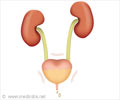Pelvic floor exercises such as Kegels can be effective for stress incontinence and urgency incontinence, said study.

‘Women who smoke are more likely to have urinary incontinence than non-smokers. Smoking is also a risk factor for bladder cancer. Your healthcare provider can help you to quit smoking to improve your bladder health.’





“Some patients desire surgery as the primary therapy because they are not interested in conservative measures. Surgery is certainly a suitable option if non-invasive options are not appropriate or ineffective. But I often recommend non-surgical options as first line therapy,” says Tola Fashokun, M.D., a female pelvic medicine and reconstructive surgeon at the Institute for Female Pelvic Health at Sinai Hospital. Urinary incontinence can happen to women at any age, but is most common in older women. The course of treatment, be it surgical or nonsurgical, is based on the type of incontinence you have and the severity of your symptoms.
The most common types of urinary incontinence are stress incontinence (a condition in which you lose urine during general physical movement or activities like coughing, laughing, sneezing or exercising) and urgency urinary incontinence (an urge to urinate so intense you lose urine before you’re able to get to the toilet, also referred to as overactive bladder incontinence). Many women have a combination of stress incontinence and urgency urinary incontinence, a condition called mixed urinary incontinence.
Pelvic floor exercises (Kegels)
Pelvic floor exercises such as Kegels can be effective for both stress incontinence and urgency incontinence.
Advertisement
“The goals of pelvic floor therapy are to strengthen the pelvic floor muscles, which are important in maintaining continence, and provide behavioral information to reduce leaking episodes,” Fashokun says.
Advertisement
Your doctor can help you take steps to control your incontinence via bladder training that gets you in the habit of using the bathroom at set times, thus helping you to better manage overwhelming urges to urinate. This is accomplished by tracking how often you use the bathroom daily and then gradually increasing the amount of time between bathroom visits.
Dietary changes (avoiding bladder irritants and changing eating habits)
Caffeinated, carbonated or alcoholic beverages are considered bladder irritants. Your doctor may recommend that you stop drinking them or limit your intake if you’ve noticed an association between these beverages and your bladder symptoms.
Spicy foods and artificial sweeteners are also common irritants. If you have constipation, which also can make incontinence worse, your doctor may recommend that you eat more fiber. You should continue to drink plenty of water throughout the day, as sufficient fluid intake helps keep your kidneys and bladder healthy and prevent urinary tract infections and constipation.
Medications
Overactive bladder medications are divided into two main classes—antispasmodics and beta agonists—prescribed for urinary frequency (increased daytime and nighttime voids) and urinary urgency (sudden urge to void). “The goal of this therapy is to relax the bladder muscle and increase the amount of urine your bladder can hold to reduce bothersome symptoms,” Fashokun says.
Vaginal Pessary
This small, removable plastic or silicone device is fitted by your doctor in the office and placed in the vagina to support the urethra, helping to reduce stress incontinence episodes. Your healthcare provider can teach you how to place and remove the pessary.
Weight Management
Obesity is associated with both stress and urgency symptoms. Studies have shown that just a small change in one’s weight may improve their bladder symptoms. Together, you and your doctor can create a plan for losing excess weight that’s right for you.
Source-Newswise










